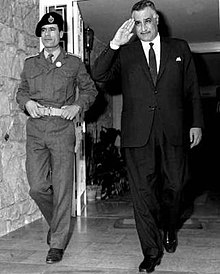Libyan Arab Republic - a state in North Africa , created after the military coup in Libya in 1969 , abolished the monarchy . Existed from 1969 to 1977
| Historical State | |||||
| Libyan Arab Republic | |||||
|---|---|---|---|---|---|
| الجمهورية العربية الليبية | |||||
| |||||
| Hymn : Allah is great | |||||
 | |||||
← September 1, 1969 - March 2, 1977 | |||||
| Capital | Tripoli | ||||
| Languages) | Arab | ||||
| Religion | Islam | ||||
| Currency unit | Libyan pound (until 1971), Libyan dinar (since 1971) | ||||
| Square | 1,759,530 km² (1954) | ||||
| Population | 1 091 830 people (1954) | ||||
| Form of government | Dictatorship | ||||
| Official language | |||||
| Chairman of the Libyan Revolutionary Command Council | |||||
| • 1969 - 1977 | Muammar Gaddafi | ||||
| Story | |||||
| • September 1, 1969 | 1969 Libyan military coup , transformation into a republic | ||||
| • January 1, 1972 | Entry into the PHAR (Federation of Arab Republics) | ||||
| • March 2, 1977 | The proclamation of Libya Jamahiriya, the reorganization of state. institutions and authorities, the abolition of the republic | ||||
On September 1, 1969, a group of “free officers” led by 28-year-old Colonel Muammar Gaddafi and with the active support of the Egyptian special services conducted a coup d'etat and overthrew the monarchy. King Idris, who was currently under treatment in Turkey, fled to Egypt. The new regime, led by the Revolutionary Command Council (SRC), proclaimed the Libyan Arab Republic. The motto of the Council was "freedom, socialism and unity."
In December 1969, a provisional constitution was issued proclaiming the need for Arab unity as the most important task of the state. The ideas of the political unity of the Arabs formed the basis of a mass political party - the Arab Socialist Union . The decree on the creation of the party was published in June 1971, the activities of other political parties were prohibited. The main task of the party was to attract the bulk of the people to governing the state and participate in large-scale reforms that were carried out by the leader of the Libyan revolution [1] .
The new government proclaimed goals to reduce “backwardness”, take an active stance in the Palestinian conflict , promote Arab unity and pursue an internal policy based on the principles of social justice, the absence of exploitation and the equal distribution of wealth. Great Britain and the United States, almost in an ultimatum, were asked to abolish their military presence in Libya as soon as possible. The days of the withdrawal of the British (March 28, 1970) and American (June 11, 1970) military bases were celebrated in the country as national holidays [2] .

Over the next four years, all oil companies were nationalized and all agreements on military and economic cooperation concluded by western companies with the government of King Idris I were terminated [2] . March 4, 1972 an agreement was signed on economic and technical cooperation with the USSR [3] .
In May 1973, Gaddafi, for the first time, publicly spoke of the ideas of the “Third World Theory,” set forth later in his famous Green Book . Gaddafi rejected both the ideas of capitalism with its exploitation of man by man, and the Soviet version of socialism with its subordination of man to the state. He declared that the basic principles of social justice are set forth in the Quran and should be revived through the direct participation of workers in production management (through people's committees) and by distributing the entire product created between them [4] .
In the fall of 1974, the RCC issued a number of laws based on Sharia. Introduced severe punishment for the use, importation and production of alcoholic beverages, were amended in family law. However, the practical implementation of the ideas of the “third world theory” met with resistance from the pro-capitalist-minded inner opposition. In June 1975, an unsuccessful attempt was made on the members of the government during a military parade; in August an attempt was made by a military coup led by the SRK O. Moheishi [5] .
On March 2, 1977, the Libyan Republic was transformed into a Socialist People’s Libyan Arab Jamahiriya (that is, the “state of the masses”) at the extraordinary session of the Universal People’s Congress (SSC) in the city of Sabha .
Notes
- ↑ The Newest History of Asia and Africa (1945-2004): studies. manual / V. I. Buzov, ed. A. A. Egorova. - Rostov n / a: Phoenix, 2005–574 p.
- ↑ 1 2 History of the East: 6 t. / Ch. ed. R. B. Rybakov (previous) and others; Institute of Oriental Studies, RAS. - M .: Eastern literature, 2008. T. 6. S. 129.
- ↑ Libya (state) - an article from the Great Soviet Encyclopedia .
- ↑ Recent history of Asia and Africa. XX century: in 3 hours. / Ed. A. M. Rodriguez. - M .: Vlados, 2001. Part 3. P. 192.
- ↑ Recent history of Asia and Africa. XX century: in 3 hours. / Ed. A. M. Rodriguez. - M .: Vlados, 2001. Part 3. P. 192-193.
See also
- Muammar Gaddafi
- Libya
- Libya History

